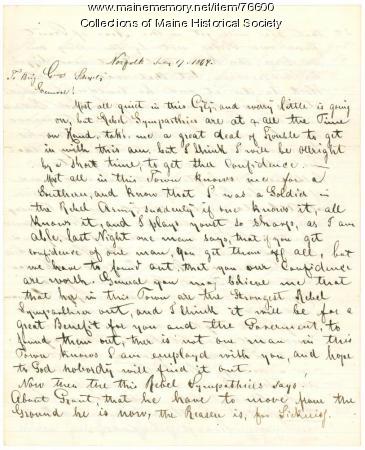
Report to Gen. Shepley on Rebel activities, Norfolk, Va., 1864
Item 76600 info
Maine Historical Society
When Louisiana elected a civilian government loyal to the Union, Brig. Gen. George F. Shepley was assigned to the Department of Eastern Virginia, again serving under Gen. Benjamin Butler.
Many of the same issues followed him.
In July 1864, H. Lockman wrote to Shepley, now commander of the Union department of Norfolk and Portsmouth, about activities of Rebel sympathizers, who, he said, trusted him and thus allowed him to get information.
He reported what the Rebel sympathizers said about Gen. Ulysses Grant and his Army of the Potomac and what Confederate Gen. Robert E. Lee planned to do.

Letter on hospital space shortage, Portsmouth, Virginia, 1864
Item 76607 info
Maine Historical Society
J. H. Franz, assistant surgeon at Balfour U.S. General Hospital in Portsmouth, Virginia, wrote to Shepley about the arrival of 150 wounded soldiers and no place to put them.
He suggested the basement of the Baptist Church and said he also would need the Episcopal Church.

Gen. Butler to Gen. Shepley on duties in Virginia, 1864
Item 76609 info
Maine Historical Society
At the end of November 1864 Gen. Benjamin Butler, commander of the Department of Virginia and North Carolina, wrote to give Shepley additional authority over the management of the city of Portsmouth, Virginia.
The two men knew one another before the war and they had served together in Louisiana when Butler was commander of the Department of the Gulf and Shepley was military governor of Louisiana.

Gen. Shepley on loss of command, Virginia, 1865
Item 76618 info
Maine Historical Society
Controversy and confusion were not new concerns.
In February 1865, Shepley sent a telegram to Lt. Col. E. W. Smith, assistant adjutant general of the Department of Virginia, seeking clarification on a telegram that he received that apparently dismissed him from his command.
He noted that the telegram was confusing about when he was to be relieved as he was president of a Court Martial that was still in session.
Shepley's friend and fellow soldier Gen. Benjamin Butler, who had commanded the Department of Virginia and under whom Shepley served, was relieved of his duty in January 1865.

Gen. Shepley appeal to Maj. Gen. Ord, Virginia, 1865
Item 76619 info
Maine Historical Society
Following up on his telegram, Shepley wrote an appeal, labeled "personal," to Major Gen. Edward O.C. Ord, commander of the Union Department of Virginia, about being relieved of his command.
Shepley wrote that the Military Commission in session at Norfolk had been collecting testimony "with regard to the official acts and conduct of myself and other General Officers," and that the testimony was secret and some based on hearsay and rumor -- and that he had no opportunity to hear it or contradict it.
He wrote, "It is publicly stated here and generally believed that I was relieved of my command in consequence of this testimony which I have never heard and therefore this respectful request and protest seems to me to be imperatively required from me."
Shepley was a lawyer and U.S. Attorney for Maine before the war.

Letter concerning charges against Gen. G. F. Shepley, 1865
Item 76620 info
Maine Historical Society
A letter dated Feb. 12, 1865 and addressed to "Charlie" discusses the charges against Shepley.
The letter, from South Boston (possibly Virginia), may have been sent to Capt. Charles Thornton, an aide to Shepley.
It speculates on the reason for the charges against Shepley and the role Gen. Benjamin Butler, who had been relieved of his command a month earlier, might have played.

Gen. E.O.C. Ord reply to Gen. Shepley on inquiry, Virginia, 1865
Item 76621 info
Maine Historical Society
The controversy continued until Feb. 19, 1865, when Gen. E.O.C. Ord wrote to Shepley, defending a military commission inquiry into activities of officers in the area.
Shepley had complained that he could not defend himself because he was not privy to the testimony, which was all secret.
Ord wrote that the commission "was not intended for the trial of any officers; it was to investigate and report upon the nature and extent of a certain illicit trade."
He assured Shepley that he was not relieved of his command because of the inquiry, but because Gen. Benjamin Butler, who also had been relieved of his command, told Ord that he intended to move Shepley from an administrative post to a field command.

Copy of Grant telegraph on Lee surrender, 1865
Item 76625 info
Maine Historical Society
Lt. Gen. Ulysses S. Grant sent a telegraph on April 9, 1865 from Headquarters Army of the U.S. to Secretary of War Edwin M. Stanton in Washington that read: "General Lee surrendered the army of Northern Virginia this afternoon on terms proposed by myself the accompaning additional correspondence will show the conditiions fully."
Brig. Gen. George F. Shepley, who had become military governor of Richmond, which had fallen less than a week earlier, kept this copy of the telegram among his papers.
He left the Army several months after Lee's surrender.
This slideshow contains 8 items

